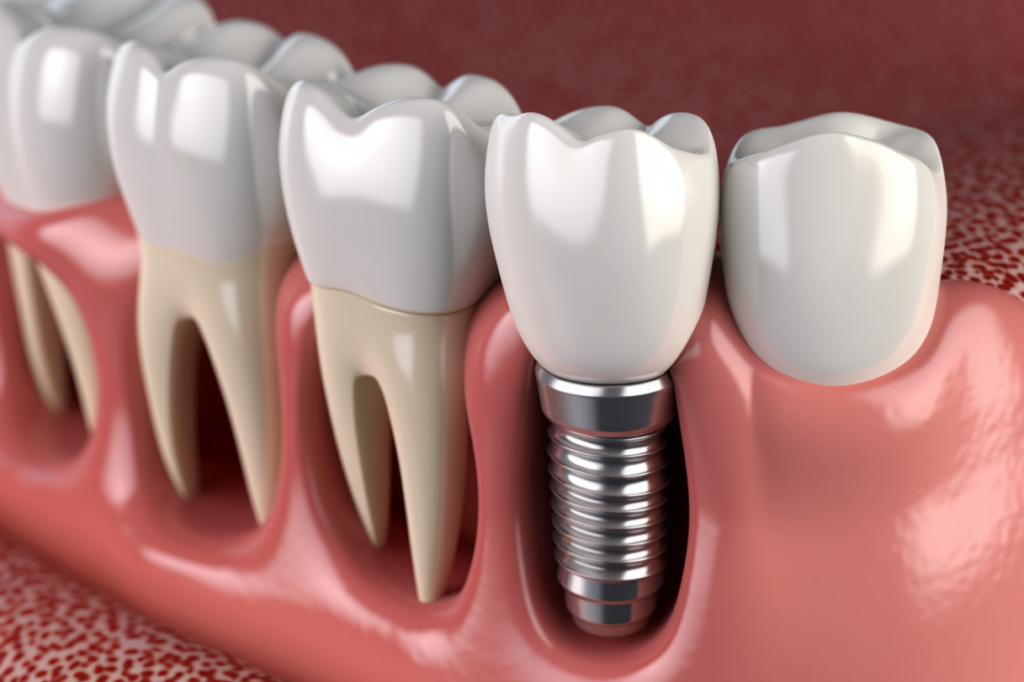Thanks for tuning in to my article on dental implants. I’m excited to share with you some of the key information about this revolutionary technology that can transform your smile and improve your quality of life.
Dental implants are one of the most popular and effective solutions for replacing missing or damaged teeth. They consist of a titanium post that is inserted into the jawbone, which then fuses with the bone tissue over time to create a strong foundation for a crown, bridge or denture.
In this article, we’ll cover everything you need to know about dental implants, including how they work, their benefits and potential risks, as well as what to expect during the implant process.
So let’s get started!
How Dental Implants Work
Dental implants are a popular and effective solution for replacing missing teeth. They work by surgically placing an artificial tooth root made of titanium or ceramic into the jawbone, which then fuses with the bone over time to create a stable foundation for a prosthetic tooth.
When it comes to implant material options, titanium is the most commonly used due to its durability and biocompatibility with human tissue. Ceramic implants are also available but may not be suitable for all patients. Your dentist will help determine which option is best for you based on your specific needs and oral health history.
Implant placement techniques vary depending on individual patient factors such as bone density and location of adjacent teeth. However, there are two main methods: traditional implant placement involves making an incision in the gum line to access the jawbone, while newer techniques like flapless surgery use smaller incisions or no incisions at all. Your dental implant specialist can discuss which technique would work best for you during your consultation.
Benefits Of Dental Implants
Now that you understand how dental implants work, let’s dive into the benefits they offer.
First and foremost, dental implants have a very high long-term success rate. When properly cared for, they can last a lifetime without needing replacement or repair. This means fewer trips to the dentist in the future and more time spent enjoying your healthy smile.
Another advantage of dental implants is their cost-effectiveness over time. While initial implant placement may be more expensive than other tooth replacement options, such as dentures or bridges, the long-term savings can be significant.
Traditional dentures often require frequent adjustments and replacements, while bridges can damage adjacent teeth and lead to further oral health issues down the line.
Lastly, dental implants offer an improved quality of life for patients. Unlike removable dentures, which can slip or cause discomfort when eating or speaking, implants function just like natural teeth. They also help maintain jawbone density and prevent bone loss that occurs with missing teeth.
Overall, choosing dental implants not only improves your appearance but also enhances your overall oral health and well-being.
By now, it should be clear why dental implants are becoming increasingly popular among patients seeking long-lasting solutions for tooth loss. With their high success rates and cost-effectiveness over time, they’re an investment worth considering for anyone looking to restore their smile and improve their quality of life.
Risks And Considerations
As with any surgical procedure, there are risks and factors to consider before getting dental implants. While the benefits of dental implants can be life-changing for patients who have lost teeth or suffer from extensive tooth decay, it is important to understand that not everyone is a good candidate for this type of treatment.
Firstly, implant failure can occur if the bone does not properly fuse with the implant post. This can happen due to several reasons such as poor oral hygiene, smoking habits, and medical conditions like diabetes. In some cases, additional procedures may be necessary to ensure successful integration between the implant and jawbone.
Secondly, bone loss can also occur around an implant over time if proper care is not taken. This could cause complications in the future and even lead to further tooth loss. Regular check-ups with your dentist and maintaining good oral hygiene practices are crucial in preventing these issues.
Thirdly, patients should be aware that getting dental implants is a lengthy process that requires multiple appointments spanning over several months. It also involves surgery which carries its own set of potential risks such as infection or bleeding.
Considerations before undergoing dental implant surgery include:
- The overall health of the patient
- Existing medical conditions that could interfere with healing
- Smoking habits (which can increase chances of implant failure)
- Financial considerations (dental implants tend to cost more than other forms of restorative dentistry)
As a specialist in dental implants, I always stress the importance of thoroughly discussing all potential risks and considerations with my patients prior to proceeding with treatment. By taking into account each individual’s unique situation and needs, we can work together towards achieving long-lasting results without compromising their health or well-being.
Remember: Dental implants are an investment in both your smile and overall oral health – make sure you do your research beforehand and choose a qualified professional who will guide you through every step of the way!
The Implant Process: What To Expect
Now that you have decided to get dental implants, it’s important to know what the implant process entails.
Before surgery, we will conduct a thorough examination of your mouth and take X-rays to determine if you’re a suitable candidate for the procedure. We’ll also discuss pre-surgery preparation such as quitting smoking or adjusting medication.
On the day of the surgery, our team will ensure your comfort with local anesthesia before inserting the implant into your jawbone. Afterward, there may be some discomfort and swelling during post-surgery recovery. You’ll need to follow specific instructions on caring for the implant site and maintaining oral hygiene.
During this time, it is essential to avoid hard foods or anything too hot or cold which can cause irritation in the area around the implant.
As part of our commitment to excellent patient care, we’ll schedule regular check-ups to monitor healing progress and address any concerns along the way. Remember that patience is key when it comes to successful dental implant treatment – but rest assured that we are here every step of the way!
Maintaining Your Dental Implants
Implant care is crucial to ensure the longevity and success of your dental implants. Proper maintenance can prevent complications, such as infection or implant failure, from occurring. Patients must understand that maintaining their dental implants requires consistent effort and attention.
Good oral hygiene habits are essential for keeping your implants in top condition. Brushing twice a day with a soft-bristled toothbrush and using an interdental brush to clean between teeth and around the implant will help remove any food particles or bacteria build-up.
Flossing should also be done daily to keep the gum line healthy.
Regular visits to your dentist are necessary to maintain optimal oral health. During these appointments, they will examine your gums and implant sites for any signs of inflammation or other issues. They may recommend professional cleaning procedures like scaling and root planning to remove plaque buildup that cannot be removed by regular brushing at home.
Remember, taking proper care of your dental implants is vital for long-term success. Follow good oral hygiene tips, visit your dentist regularly, and notify them immediately if you notice any changes in how your implants feel or function. With proper care, dental implants can last a lifetime!
Frequently Asked Questions
How Much Do Dental Implants Cost?
When it comes to the cost of dental implants, there are several factors that can affect the overall price. These include the number of teeth being replaced, the type of implant used, and any additional procedures needed prior to placing the implant.
Financing options are available for those who need assistance with payment, such as payment plans or dental insurance coverage.
As a dental implant surgeon, I always recommend discussing all options with your dentist to find the best solution for your individual needs and budget.
Are Dental Implants Covered By Insurance?
When considering dental implants, many patients wonder if their insurance will cover the cost. While coverage varies depending on your specific provider and plan, it is important to note that dental implant surgery can be expensive without insurance assistance.
However, many dentists offer financing plans or accept credit cards to make treatment more accessible and affordable for patients. As a specialist in dental implants, I always recommend discussing payment options with your dentist prior to undergoing any procedure to ensure you are comfortable with the financial commitment.
How Long Do Dental Implants Last?
Implant maintenance is crucial in ensuring the longevity of dental implants. Proper oral hygiene habits, such as brushing and flossing regularly, can help prevent implant failure caused by gum disease or infection.
Additionally, routine check-ups with a dental implant specialist are recommended to detect any issues early on and address them promptly.
While there is no set time frame for how long dental implants last, they have been known to function for decades with proper care. However, it’s important to note that factors such as age, overall health, and lifestyle habits can also affect the lifespan of dental implants.
Can Dental Implants Be Done In One Day?
As a dental implant specialist, I’m often asked if same day implants are possible.
The answer is yes, but it’s important to understand the implant procedure timeline and what factors can affect whether or not a patient is a good candidate for this option.
Same day implants involve placing the implant post and attaching an abutment and temporary crown all in one appointment.
This approach can be beneficial for patients who want to minimize their time in the chair and reduce overall treatment costs.
However, not everyone is eligible for same day implants based on factors like bone density, gum health, and other medical conditions that may slow down healing after surgery.
It’s crucial to have a thorough consultation with your dental team before deciding if same day implants are right for you.
Is There An Age Limit For Getting Dental Implants?
As a dental implant specialist, I often receive questions from patients about whether there is an age limit for getting dental implants.
The good news is that there isn’t necessarily an upper age limit for seniors needing implants, as long as they are in good overall health and have enough bone density to support the implant.
However, younger patients may be at higher risk for complications due to their bodies still developing, so it’s important to carefully evaluate each patient’s individual situation before proceeding with any treatment plan.
Overall, dental implants can provide great benefits for patients of all ages who are missing teeth or require tooth replacement.
Conclusion
As a dental implant specialist, I hope this article has provided you with some valuable information about the basics of dental implants.
It’s important to understand that costs can vary depending on several factors such as the number of teeth being replaced and any additional procedures needed. Insurance coverage for dental implants is not always guaranteed, so it’s crucial to check with your provider before receiving treatment.
One common question patients ask is how long their dental implants will last. With proper care and maintenance, they can last up to 25 years or more! And if time is an issue for you, same-day implant solutions are available in some cases.
Ultimately, age should not be a limiting factor when considering dental implants – as long as there is enough bone density present and overall health conditions permit the procedure. As always, consult with a trusted oral healthcare professional to determine what options are best suited for your unique needs.



